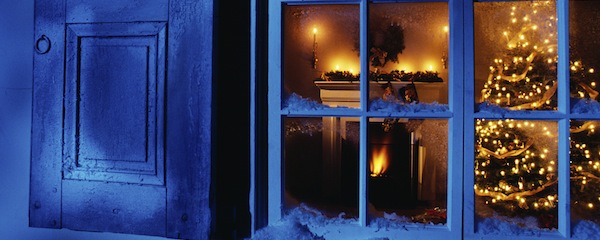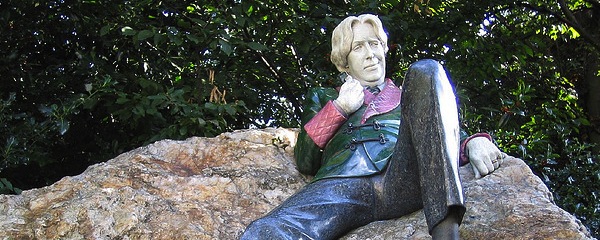
photo © William Murphy, 2004
by Eleanor Fitzsimons
When Aimée Lowther was a girl, she would rush home to write down the wonderful stories that her friend Oscar told her. Years later, in 1912, four of these stories were published in The Mask: A Quarterly Journal of the Art of the Theatre. They were ‘The Poet’, ‘The Actress’, ‘Simon of Cyrene’ and ‘Jezebel’. Each was captioned, ‘An unpublished story by Oscar Wilde’, and prefaced with the words:
This story was told by Wilde to Miss Aimée Lowther when a child and written out by her. A few copies were privately printed but this is the first time it has been given to the public.
Lowther was in her forties by then, and had enjoyed some success as a playwright and amateur actress. As Wilde’s life had ended twelve years earlier, in room sixteen of the Hotel d’Alsace in Paris, he was unable to verify her claims. However, one of these stories, ‘The Actress’, was believed to have been inspired by his great friend Ellen Terry. Edward Gordon Craig, editor of The Mask, was Terry’s son and Aimée Lowther was her close confidante.
Wilde loved Lowther. It is recorded in Richard Ellmann’s biography on Wilde that, when she was just fifteen, he declared: “Aimée, if you were only a boy I could adore you.” In return, she remained loyal to him to the end, and a visit from her could lift his spirits even when he was at his lowest ebb: ‘…your friendship is a blossom on the crown of thorns that my life has become’, he told her in a letter, now collected in The Complete Letters of Oscar Wilde. In A Pride of Terrys, Marguerite Steen wrote that, in 1900, Lowther and Ellen Terry spotted a much diminished Oscar Wilde gazing longingly through the window of a Parisian patisserie and biting his fingers with hunger. They invited him to dine, and were greatly relieved when he ‘sparkled just as of old’, but they never saw him again.
The veracity of Lowther’s claim that Wilde told these four stories to her is borne out by a letter he sent her in August 1899, asking that she not allow the publication of ‘the little poem in prose I call ‘The Poet’’, as it was due to ‘appear next week in a Paris magazine above my own signature’. No such magazine has ever been identified. However, 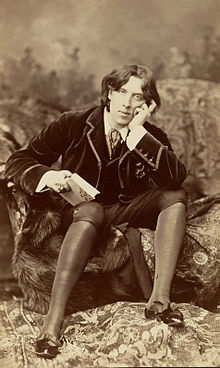 controversy arose when Gabrielle Enthoven, a passionate collector of theatrical memorabilia, claimed that Wilde had told these stories to her. In 1890, she commissioned the private printing of Echoes, a limited edition, twelve-page pamphlet containing the four stories in question. Aimée Lowther owned a copy of Echoes, which she later gave to Oscar’s younger son, Vyvyan, and the stories reproduced in both Echoes and The Mask are almost word for word the same.
controversy arose when Gabrielle Enthoven, a passionate collector of theatrical memorabilia, claimed that Wilde had told these stories to her. In 1890, she commissioned the private printing of Echoes, a limited edition, twelve-page pamphlet containing the four stories in question. Aimée Lowther owned a copy of Echoes, which she later gave to Oscar’s younger son, Vyvyan, and the stories reproduced in both Echoes and The Mask are almost word for word the same.
Of course it is entirely possible that Wilde told the same stories to both women. He was a born storyteller and could harness the power of the spoken word in a way that was reminiscent of the seanchaí (a figure familiar to him from his father’s careful documenting of the oral tradition that thrived in his native Ireland).
In A Woman of No Importance, Wilde has his Lord Illingworth say, ‘A man who can dominate a London dinner-table can dominate the world’. His own popularity was assured by his eagerness to entertain, to the extent that society hostesses took to including the words ‘to meet Oscar Wilde’ on invitations, in a bid to boost attendance at their gatherings.
Wilde’s popularity as a storyteller was enhanced by the fact that he possessed an exceptionally melodious voice, which Lord Alfred Douglas described as ‘golden’. Frank Dyall, the actor who played Merriman in the first production of The Importance of Being Ernest, recalled Wilde’s voice as being:
…of the brown velvet order – mellifluous, rounded, in a sense giving it a plummy quality, rather on the adenotic side, but practically pure cello, and very pleasing.
~ from Hesketh Pearson’s The Life of Oscar Wilde
To add drama to a narrative, Wilde would modulate his voice from a whisper to a cry of triumph, losing himself in his stories to the extent that those present described him as seeming dazed by the effort of telling them. Yet his true power was in the words. In his auto-biography, William Butler Yeats, Wilde’s contemporary and compatriot, said of him: ‘I had never before heard a man talking in perfect sentences, as if he had written them all overnight with labour and yet all spontaneous.’
One guest fortunate enough to be present at a lunch hosted by publisher and bon vivant Frank Harris described how Wilde’s musical voice and infectious laughter cut through the lively chatter, causing everyone present to fall silent in order to listen exclusively to him. In response, Wilde filled the hours that followed with humorous anecdotes, embryonic plotlines for plays he was contemplating, macabre tales told in the style of Edgar Allan Poe, and his distinctive take on instructive Bible stories. Frank Harris published several of these spontaneous stories under the heading ‘Poems in Prose’, in The Fortnightly Review, but it is probable that they lost something in the transcribing. Robert Ross was a great friend and literary executor to Wilde and, in his introduction to Essays and Lectures by Oscar Wilde, he claimed:
To those who remember hearing them from Wilde’s lips, there must always be a feeling of disappointment on reading them. [Ross] overloaded their ornament when he came to transcribe them, and some of his friends did not hesitate to make that criticism personally.
Although he made no attempt to alter his accent, Wilde spoke excellent, ponderous French and, in Paris, earned a reputation as ‘the poet who tells fantastic tales’. His visit to that city in 1891 was described by L’Echo de Paris as, ‘le “great event” des salons littéraires parisiens’. Young André Gide, who would go on to win the Nobel Prize for literature towards the end of his long life, found Wilde utterly captivating and met with him every day for three weeks. After parting from Wilde, Gide felt unable to put pen to paper for several days. In correspondence published by the University of Chicago Press, it is noted that, when he finally made contact with poet Paul Valéry on Christmas Eve, 1891, Gide asked him to ‘please forgive my silence: since Wilde, I hardly exist anymore’. Once, as Gide and Wilde were dining at the home of Princess Ouroussoff, wife of the Russian ambassador to France, the princess swore that a halo appeared around Wilde’s head as he talked.
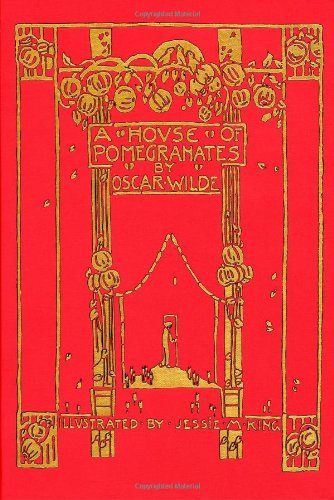 Princess Ouroussoff was not alone in attributing otherworldly properties to Wilde’s flights of fancy. Lord Alfred Douglas believed that Wilde could cure depression or disease simply by speaking to an afflicted person for just five minutes. The artist W. Graham Robertson, who described Wilde as ‘a born raconteur’ in his auto-biography Time Was, was certain that Wilde had cured him of a ‘violent toothache’ by telling his stories ‘so brilliantly that for an hour and a half I laughed without ceasing’. Some were moved despite themselves. The poet Ernest Dowson attested that Wilde ‘had such a wonderful vitality and joie de vivre that after some hours of his society even a pessimist like myself is infected by it’.
Princess Ouroussoff was not alone in attributing otherworldly properties to Wilde’s flights of fancy. Lord Alfred Douglas believed that Wilde could cure depression or disease simply by speaking to an afflicted person for just five minutes. The artist W. Graham Robertson, who described Wilde as ‘a born raconteur’ in his auto-biography Time Was, was certain that Wilde had cured him of a ‘violent toothache’ by telling his stories ‘so brilliantly that for an hour and a half I laughed without ceasing’. Some were moved despite themselves. The poet Ernest Dowson attested that Wilde ‘had such a wonderful vitality and joie de vivre that after some hours of his society even a pessimist like myself is infected by it’.
Although he was a very public raconteur, Wilde saved some of his best stories for home, remarking that it was the duty of every father to invent fairytales for his children. In his memoir, Son of Oscar Wilde, Vyvyan Holland wrote of a ‘never-ending-supply’ of fairy stories and tales of adventure, many of them inspired by the imaginings of Jules Verne, Robert Louis Stevenson and Rudyard Kipling; Wilde always was a literary magpie. Holland recalled one particular bedtime story, reminiscent of ‘The Elves and the Shoemaker’, which described the helpful fairies who lived in the great bottles of coloured water found in the windows of chemist shops. They would dance about at night before making the pills that the chemist would dispense the next day.
Many of Wilde’s bedtime stories were rooted in the misty mythology of the West of Ireland, where his father had once kept a holiday cottage at Moytura. He kept his boys rapt with his description of the ‘great melancholy carp’ that lived in the deep waters of Lough Corrib, refusing to move off the bottom of the lake unless Wilde himself called them up with the ancient Irish songs that his father had taught him. At times, Wilde was moved to tears by his own ingenuity. His eyes glistened as he told his boys the story of ‘The Selfish Giant’ and when his elder son, Cyril, wondered why, Wilde replied that really beautiful things always made him cry.
Many of Wilde’s stories started life in the nursery of his Tite Street home, but in a letter to Amelie Rives Chanler, from 1889, he was adamant that they were intended ‘not for children, but for childlike people from eighteen to eighty’. His great friend Helena Swanwick recognised that the only stimulus he needed to tell a story was to be in the company of good listeners. In her memoir, I Have Been Young, she describes Wilde:
…his indolent figure, lounging in an easy chair, his face alive with delight in what he was saying, pouring out stories and descriptions, whose extravagance piled up and up.
Once, after she allowed her scepticism to show, he enquired playfully: ‘You don’t believe me, Miss Nelly? I assure you… well, it’s as good as true.’
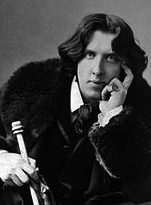 Such was Wilde’s prolificacy that only a tiny fraction of the stories he told ever made it into print, and he would commit a story to paper only if the reaction of his audience merited it. If one of his stories was published, Wilde would often dedicate it to a society hostess whose largesse he had enjoyed. The stories in his collection A House of Pomegranates, which is dedicated to his wife, Constance, pay tribute to four such women: ‘The Young King’ is dedicated to Margaret, Lady Brooke, who would one day lend great support to Constance; ‘The Fisherman and his Soul’ was chosen for Princess Alice of Monaco – Wilde told her it was the best of the four; ‘The Star-Child’ was saved for the socialite Margot Tennant, who had recently become Mrs. Asquith, and would later disown Wilde when he most needed her support; and ‘The Birthday of the Infanta’ was dedicated to Lady Desborough, ‘as a slight return for the entrancing day at Taplow’. Later, Lady Desborough received a ‘little book that contains a story, two stories in fact that I told you at Taplow’. This ‘little book’ was Lord Arthur Savile’s Crime and Other Stories.
Such was Wilde’s prolificacy that only a tiny fraction of the stories he told ever made it into print, and he would commit a story to paper only if the reaction of his audience merited it. If one of his stories was published, Wilde would often dedicate it to a society hostess whose largesse he had enjoyed. The stories in his collection A House of Pomegranates, which is dedicated to his wife, Constance, pay tribute to four such women: ‘The Young King’ is dedicated to Margaret, Lady Brooke, who would one day lend great support to Constance; ‘The Fisherman and his Soul’ was chosen for Princess Alice of Monaco – Wilde told her it was the best of the four; ‘The Star-Child’ was saved for the socialite Margot Tennant, who had recently become Mrs. Asquith, and would later disown Wilde when he most needed her support; and ‘The Birthday of the Infanta’ was dedicated to Lady Desborough, ‘as a slight return for the entrancing day at Taplow’. Later, Lady Desborough received a ‘little book that contains a story, two stories in fact that I told you at Taplow’. This ‘little book’ was Lord Arthur Savile’s Crime and Other Stories.
After Wilde was imprisoned, Adela Schuster, whom he christened ‘Miss Tiny’ on account of her size, believed that his stories might save him. She wrote to his friend More Adey:
Could not Mr. Wilde now write down some of the lovely tales he used to tell me? […] I think the mere reminder of some of his tales may set his mind in that direction and stir the impulse to write.
In her letter, Schuster recalled, in particular, two stories that Wilde had told her: one concerning ‘a nursing sister who killed the man whom she was nursing’; and a second that was about ‘two souls on the banks of the Nile’. To these Adey added, ‘the moving sphere story and the one about the Problem and the Lunatic’.
Sadly these, and many others, never found their way into print. In a letter to Robert Ross, dated May 1898, Wilde wrote: ‘I really must begin The Sphere.’ He never did, although Frank Harris did publish a version of it as ‘The Irony of Chance (after O.W.)’. Ross sheds light on the inspiration for many of the stories that ‘unfortunately exist only in the memories of friends’, confirming that they were:
Invented on the spur of the moment, or inspired by the chance observation of someone who managed to get the traditional word in edgeways; or they were developed from some phrase in a book Wilde might have read during the day.
How disappointing it is that we will never hear them. How I envy those who enjoyed that great pleasure.
~
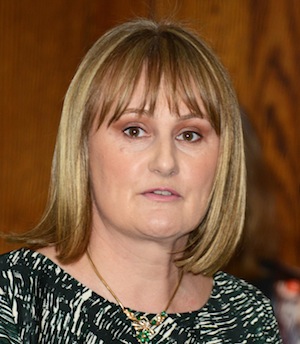 Eleanor Fitzsimons works as a freelance feature writer and researcher. Her articles have appeared in publications including,History Today, The Irish Times, The Sunday Times, History Ireland, The Keats-Shelley Review and The Guardian. She has researched documentaries for the Irish national broadcaster, RTÉ. Eleanor has an MA in Women, Gender and Society from University College Dublin, and both Bachelor of Commerce and Master of Business Studies degrees from the same University. In 2013, she won the Keats-Shelley Prize and was runner-up for the Biographers’ Club Tony Lothian Prize with ‘A Want of Honour’, her proposed biography of Harriet Shelley. She is represented by the Andrew Lownie Literary Agency, and is working on a book about the women who influenced Oscar Wilde for Duckworth Overlook.
Eleanor Fitzsimons works as a freelance feature writer and researcher. Her articles have appeared in publications including,History Today, The Irish Times, The Sunday Times, History Ireland, The Keats-Shelley Review and The Guardian. She has researched documentaries for the Irish national broadcaster, RTÉ. Eleanor has an MA in Women, Gender and Society from University College Dublin, and both Bachelor of Commerce and Master of Business Studies degrees from the same University. In 2013, she won the Keats-Shelley Prize and was runner-up for the Biographers’ Club Tony Lothian Prize with ‘A Want of Honour’, her proposed biography of Harriet Shelley. She is represented by the Andrew Lownie Literary Agency, and is working on a book about the women who influenced Oscar Wilde for Duckworth Overlook.

